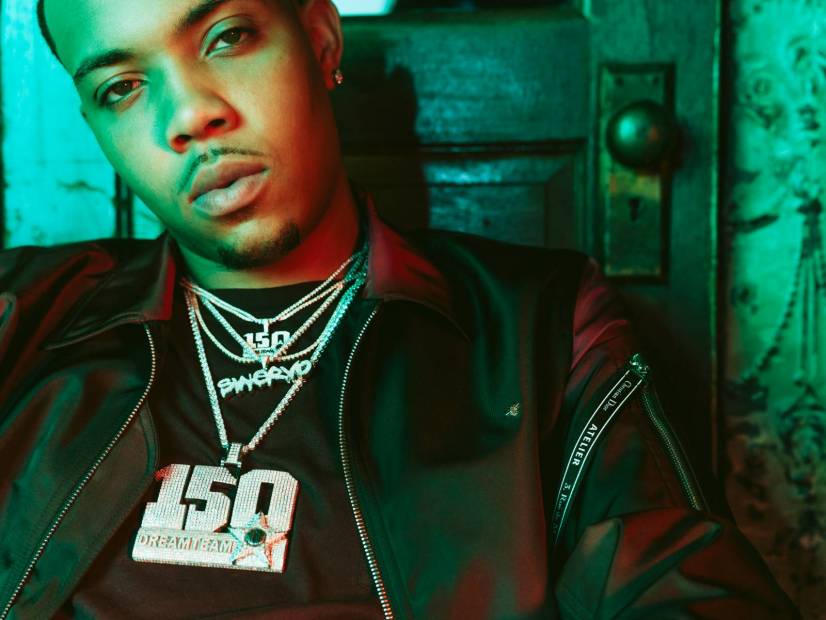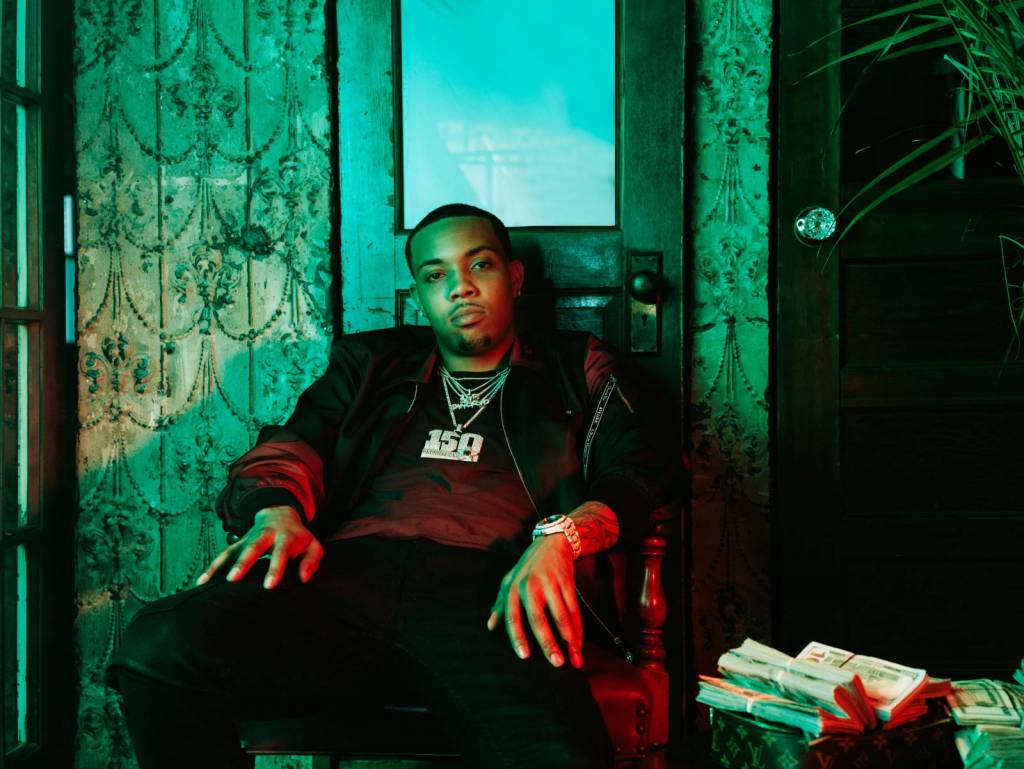
G Herbo is set to release forthcoming studio album titled PTSD this month and it’s his most cohesive project yet, delivering a reflection of what it’s like growing up in Chicago with post-traumatic stress disorder.
Speaking with GroovyTracks, Swervo recalled when he had his moment of clarity about the effects of PTSD. He also shared how he used his newfound clarity to create PTSD.
“When the lawyer told me to go see the therapist, it was really just me embracing it,” G Herbo explained during our phone conversation. “I think I was already aware of the issue, and why I even had to get arrested, or have to carry a gun in the first place.”
In 2018, the 24-year-old raised as Herbert Randall Wright III, was arrested along with two other men when their limousine driver called the police on them for having guns.
Police state the gun in Herb’s possession was a Fabrique National. The weapon allegedly had one in the chamber and 30 in the magazine, sending him to jail. At first, Herb was hesitant about speaking with a therapist but ultimately, he found it useful.
“To be honest, I wasn’t familiar with going to share my problems with somebody so I already didn’t think it was something that I would want to do,” he said. “That was probably my first introduction to me embracing my PTSD, but we’re so immune to a lot of this stuff that go on in the inner city with like violence, going to jail and all that kind of shit.
“It’s like, we kind of don’t know that we suffer from these mental health issues. I’m a product of that. I was shot at. I seen my first murder at nine years old. A lot of this stuff that we encounter on a day-to-day basis, we think is normal just because it’s our reality. We think it’s something we’re supposed to be going through. I feel like in the poverty-stricken neighborhoods, a lot of us are suffering from PTSD. I thought it was important for me because I know it’s a lot of people who are like me.”
He’s already released the album’s first single, “In This Bitch” and “Shooter” with Jacquees.
The artwork for PTSD sends a stark message using the American flag — all 50 stars have been replaced with the heads of his late friends and family members, including Juice WRLD.
One stand-out cut features Grammy Award-winning artist 21 Savage on a song titled “By Any Means.”
21 and Herb have both been open musically about their perpetual and circumstantial lifestyle driven by survival instincts, gang banging, trapping, violence and lack of resources in poverty-stricken neighborhoods. The result of living in these conditions is a mental condition called post-traumatic stress disorder.
“We have had serious conversations about what we are to the people and just embracing it,” he told DX of connecting with 21 for the song.
“Our flaws, and the shit that we’ve been through that made us make some of the good and bad decisions that we made in our life. We had those conversations before, and that’s kind of what inspired the record or what wanted me to put Savage on the record. I knew that it was a record that was true to him, as well as it’s true to me, because we’ve been through a lot of the same stuff.”

In the season of his lawyer asking him to see a therapist, he began to examine the trauma behind his actions.
“I think probably one of the key points for me was I was going to speak to these kids in a juvenile correctional facility,” he said. “They asked, ‘Raise your hands if you feel like you ever been victimized by anything, or you’re a victim, or you feel like a victim in a way.’ And nobody raised their hand. And then, the next question was, ‘Raise your hand if you ever have experienced police brutality, or you ever experienced someone getting killed in front of you, or if you ever been shot before.’ Pretty much the whole room raised their hand, including me.
“We’re so immune to these endeavors that we got to encounter every single day. A lot of the shit that go on in the inner city, we don’t realize that we really suffer from these mental health issues. That’s why we paranoid. You want to carry a gun, and you don’t want to go travel to this neighborhood, travel in that neighborhood, but it’s all just a product of us suffering from this mental health issue.
“That alone kind of opened my brain up in a way, because I always was talking about it. The more I just grew and matured as a man, and just learning more stuff and seeing what’s going on, going to talk to these kids that really listened to me, and I could see a lot of myself in them. So it’s important to me. It’s just as important as the music, to me.”
Another profound track on PTSD is “Gangstas Cry.” When asked how long it took for him to get comfortable with crying in a world when men are told that they shouldn’t, he said he never had too.
“Man, I never really like been afraid to be that person,” he said. “I’ve been losing homies since I was in eighth grade, so I’ve always been sentimental, and emotional about a lot of the shit that I went through in my life. I shed tears for a ton of my friends that died throughout this journey of mine.”
The song itself was inspired by a gift his girlfriend Taina Williams had created for him with the face of his late grandmother. The sweet moment brought Herb to tears and quickly went viral. Videos spread of him wiping tears from his face as his girl affectionately consoled him up.
“Just be a human,” Herb said of his intentions behind “Gangsta’s Cry.” “My grandmother was like a key component in my life period. I just felt overwhelmed with emotions at times. I think a lot of times people are so caught up to what’s cool and what’s not, so they don’t really think it’s okay to cry or feel emotional. I feel like I got enough security as a man, and I’m masculine enough to know that I’m not compromising myself, or my respect just for being emotional. I wanted to really shed light on that.”
To do his part in the healing PTSD in the streets of Chi-town, Herb has consumed himself into a project on turning Chicago’s historic Anthony Overton Elementary School into a place the youth of the city can come to stay out of trouble.
“My music is cause, effect, and solution. Overton is one of the solutions for this problem,” he said of an update on the project.
“We’re actually breaking ground on it mid-spring, summer, this year,” he continued. “We got one facility 10,000 square feet. That’s going to be the multi-media facility, for videographer, then there’s going to be a green screening room, a stage for people to kind of maximize on their talent, and maximize on really finding themself.
“I come from youth centers where we have somewhere to go and where we could stay out of trouble, and have a sense of family, love and unity, where a lot of these kids don’t have that aside from going to school, aside from going to the youth center,” he continued. “You would think, or you would assume that they have that at home, but majority of these kids don’t have it at home. So that’s important for me to be able to put that back into my community, because I know that was something that was a big part of my upbringing, and it was something that I missed when I didn’t have it anymore. It’s real important for me to stay on top of it and get in front of just the problem here because I’m talking about us having PTSD, and being in these situations where you got to fear for your life, or sometimes put your life and your freedom at risk just to provide. We’re acknowledging the problem, then what are we going to do about it?”
G Herbo told us one of the most important things the youth and community in Chicago need as a whole are the resources for success.
“A lot of these kids feel like you don’t care and a lot of times people really don’t care about the shit that they’re going through. You don’t ask these kids when they go to school, ‘How was your day? How did yesterday go when you left school?’ A lot of these kids got to leave school and watch their brothers and sisters and their friends get murdered. Come back to school and you expect them to ace tests. You’ve got to be their resource, that helping hand and just show them.
“And I could show them, not only that I care, but I once were you,” he further stated. “I was a product of that. I lost 10, 20, 30, 40, 50, of my close friends. I’ve been shot. I had to carry a gun on me every day for the past 10 years of my life. So where you could show them that, and give them an opportunity, they’re going to gravitate towards the opportunity, because a lot of these kids don’t know, when you leave the house that you’re facing going to do 100 years in jail, or you’re facing meeting your demise. You may die. I knew every day I left out the house, I could potentially die or go to jail and I think that’s what kept me safe. I was able to maneuver, and do certain things, and use my brain in critical situations to make sure that I did get home at night and a lot of these kids don’t have those same tools.”
It’s clear Herb is taking his influential role as a rap star out of Chicago seriously. From his inspiring forthcoming PTSD album to making sure the youth of the city are aware that there are people that actually care, Herb is already making a profound impact on the next generation of leaders.
“To be honest, I see my legacy going, like reaching heights that I probably didn’t even imagine because I’m not afraid to get in front of my problems and I feel like this album is going to be kind of the stepping stone for that,” he said of his intentions for PTSD. “It’s one of my most vulnerable projects that I think I’m using my life situations not only for me or not for fame, or gains, or like glorify, but to spread awareness, and help other people. I feel I’m only competition. This is only going to really end where I end it.”
G Herbo’s PTSD Tour kicked off on February 10 and is scheduled to wrap March 22 in San Francisco. Tickets are on sale now.


 59
59